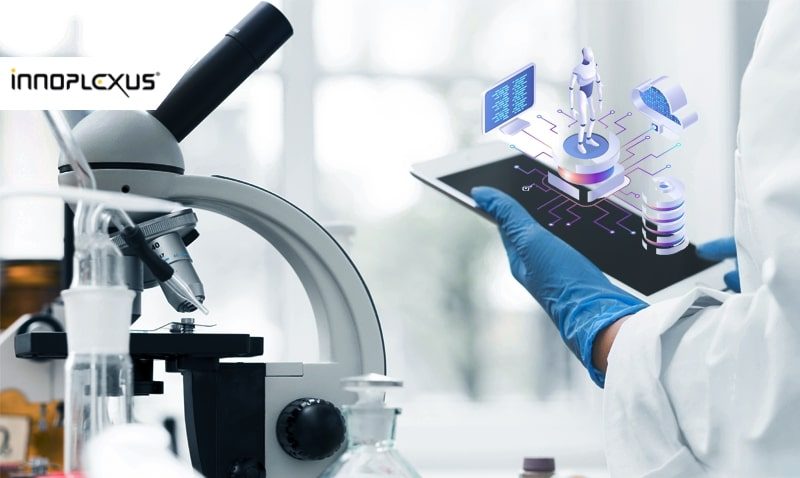
What’s New in Ontosight® Terminal 1.1 A Complete Guide toRead More

What’s New in Ontosight® Terminal 1.1 A Complete Guide toRead More
May 24
Apr 24

Innoplexus wins Horizon Interactive Gold Award for Curia App
Read More
The cost of developing a new drug roughly doubles every nine years (inflation-adjusted) aka Eroom’s law.

As the volume of data for drug discovery and development explodes, the ability of Pharma and medical practitioners to keep up and accelerate drug discovery becomes more challenging. In contrast, the software industry reaps the benefits of Moore’s law with high powered computing, and increased internet bandwidth.
A transition to Moore’s Law can only be achieved by the joint effect of technological and conceptual paradigm shifts. In the past few years, AI has emerged as a promising technological solution to address many of the problems plaguing the industry.
At Innoplexus, we develop AI technology for the pharmaceutical industry to unleash the value of machine learning and solve many of the challenges facing Pharma such as high costs in R&D, long timelines, and inadequate research. We have made substantial progress in generating intelligence and insights across the pre-clinical, clinical, regulatory, and commercial phases of drug development to discover the most relevant knowledge and patterns.
As Pharma companies begin to leverage AI, applications of machine learning will improve Pharma processes. A few examples are as follows:
Drug Discovery – Combining the disease expertise of pharmaceutical companies with advanced applications of machine learning models yields unprecedented efficiencies in drug discovery. The collaboration between Pharma and IT companies enables the preparation of large and diverse datasets to build ML models that accelerate drug discovery and development. Today, Pharma is adapting new AI technologies and tools to leverage their capabilities more than ever before.
Biomarker Development – AI technology is adopted by several pharmaceutical companies to advance diagnostics, toxicology, and biomarker discovery in the areas of neurology, endocrinology, and oncology. For example, machine learning identifies the molecular signatures and potential targets for precision medicine.
Clinical Trials – Machine learning can improve the outcome of clinical trials by examining hundreds of parameters and possible values to predict which ones need to be altered to increase the probability of success. For instance, by comparing clinical trials held in the past for similar diseases or drugs, machine learning can help determine the optimal sample size, reduce errors, and adjust protocols at different geographies. Machine learning based solutions improve these studies by connecting drugs, indications, study design, trial information, patients, authors, and sponsors with real-world events.
When Machine Learning is adopted early in the drug development cycle, it can reduce the drug discovery time, streamline the research process, accelerate development, and create opportunities to repurpose drugs and diversify pipelines. According to a Deloitte1 study, in the next five to ten years, the number of companies to adopt AI technologies for drug discovery will increase exponentially and research will be done mostly in silico.
Embracing AI and machine learning will help address the challenges of increasing costs and declining ROI for pharmaceutical R&D.
The cost of developing a new drug roughly doubles every nine years (inflation-adjusted) aka Eroom’s law. As the volume of data…
There was a time when science depended on manual efforts by scientists and researchers. Then, came an avalanche of data…
Collaboration with key opinion leaders and influencers becomes crucial at various stages of the drug development chain. When a pharmaceutical…
Data are not the new gold – but the ability to put them together in a relevant and analyzable way…
Artificial intelligence, or AI, is gaining more attention in the pharma space these days. At one time evoking images from…
Artificial intelligence (AI) is transforming the pharmaceutical industry with extraordinary innovations that are automating processes at every stage of drug…
There is a lot of buzz these days about how artificial intelligence (AI) is going to disrupt the pharmaceutical industry….
Drug discovery plays a key role in the pharma and biotech industries. Discovering unmet needs, pinpointing the target, identifying the…
The pharmaceutical industry spends billions on R&D each year. Clinical trials require tremendous amounts of effort, from identifying sites and…
Training algorithms to identify and extract Life Sciences-specific data The English dictionary is full of words and definitions that can be…
The early 1970s introduced the world to the idea of computer vision, a promising technology automating tasks that would otherwise…
Summary: AI could potentially speed drug discovery and save time in rejecting treatments that are unlikely to yield worthwhile resultsAI has…